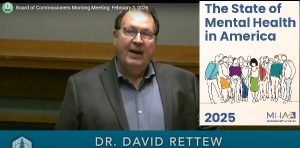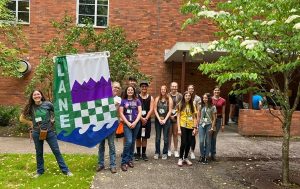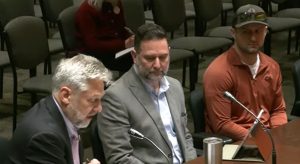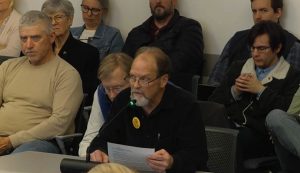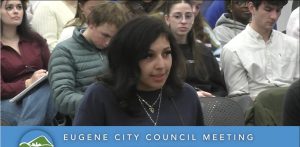Top stories of 2022: The New Era Convergence
5 min read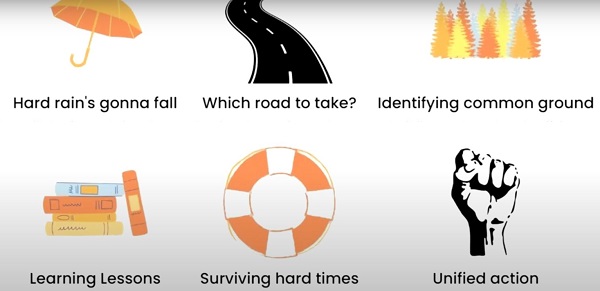
Activists from the Pacific Northwest convened for three days in August 2022 at Sky Camp, Fall Creek Reservoir, to discuss a more equitable and sustainable way of life.
[00:00:11] Ravi Logan: The New Era Convergence was an audacious undertaking, really. We started out just feeling a compelling need to bring people together to have some deep conversations that we didn’t see being had elsewhere. There’s a lot of news, a lot of information coming at us, and there’s not been a lot of deep collective reflection on where we stand.
[00:00:37] Clare Strawn: The pressing issues of the day were to figure out where we wanted to go and how we were going to get there. And that also felt nobody was really addressing those in a kind of comprehensive, holistic way. And we felt that based on our decades of activism and thinking on these questions that we could, you know, convene this conversation.
[00:01:03] Many of us have a lot of experience doing this work in the past, and very rarely do activists sit down and evaluate. What is it that we do? What is it? What, how has this moved us forward? Really, what can we take forward and what didn’t work? What mistakes do we not want ’em to make again?
[00:01:26] People were interested in the concept and it was generally hard to wrap our brain around a big picture, because we’re very much entrained in the project that we’re involved in doing.
[00:01:37] We are housing the homeless, we are doing, taking down carbon. We’re working with the city government to implement better policies and so it’s really challenging to say yes, yes, yes, and, how do we weave those together so that we have a more synergetic impact?
[00:01:57] Ravi Logan: There’s a diversity of silos that we’re functioning out of, and there’s some with bigger arcs, grander arcs to their thinking. There was a point at which I sat down and tried to hold in my mind all of the conversations we were having. And when I sat with them, I saw, yeah, there is a natural arc from a, starting from a realization of just the depth of the threat that humanity is now facing.
[00:02:29] As we went through, just looking at one arena after another of the society, people were bringing forward their awarenesses and started to paint a picture. What we’re looking at in terms of climate change, environmental degradation, what we’re looking at in terms of the political landscape, just increasingly moving into illiberalism and dysfunction, what we’re looking at in terms of the social arena, just greater and greater alienation and antagonism between competing tribes.
[00:03:04] How we’re situated economically, the concerns that people are having as to how fragile the economy seems, and where that might be headed. You build that all together. And we started to create some ground that, yeah, this is now momentous. And we have to have a response that is commensurate with the intensity of the moment. We have to rise to the occasion.
[00:03:34] Jason Schreiner: People had a recognition that there’s in fact, a diversity of ways in which we have to go about this work. There’s no single approach that’s just going to solve the problems. And so we need to have diverse fronts of action.
[00:03:47] And then in addition to that was the realization that okay, to what extent do we formalize that? And the kind of challenges of coordinating that. So for example, how do you balance some kind of an organization that can hold that picture together, with all the different other organizations doing some of the more specific work?
[00:04:06] How does that—how do those relationships work? And then especially in the context of—and this was something else that emerged was the issue of resources—how do we resource these different pathways without getting into a lot of competition with each other but also recognize that there’s a need for resources across multiple fronts.
[00:04:24] And then also thinking about different, the relationship between different levels and scales of action. Some folks are very focused, more individually in their lives, about making change maybe at their neighborhood level. Other folks are thinking larger scale.
[00:04:39] If the motive of profit is not going to be the unifying feature for the kind of dominant activities that order and rule and organize our lives, then how do you then build unity and solidarity, in particular when you have some of the issues that we’ve brought up, which is you have people working on different fronts for different things with different goals in mind, with different approaches. How to bring all that together is a huge question.
[00:05:05] Clare Strawn: So next steps, I think it has to be distributed. So it’s got to be distributed. And then it’s got to be networked. We have to have ways to communicate with each other. We have to have ways to support each other, institutionalized ways to manage our resources and our money and to get more money. We have to have ways to train and develop the skill sets and capacities of people on the ground.
[00:05:33] Some of the people who came to the convergence are doing— Pachamama has a whole education training program. Ananda Marga has a program, Transformation Education, there’s one called Democracy School. So there’s a lot of education programs that we can coordinate and build accessibility to in a broader level online, and that could also partner with on-the-ground practice and for movement-building. So those are some ideas of next steps.
[00:06:02] The other thing that was important I think, is that there’s several layers of action. One is dealing with immediate response to crisis. Like: A town burns down and people need a place to go, but then the solutions from that should point towards the new system. Why aren’t we able to move into a situation where an entire town is burnt down and put, you know, develop a permaculture community that’s off the grid and energy-free?
[00:06:33] Ravi Logan: There was appreciation of the need for big vision and for concrete implementation, for thinking through where we need to go, but also to have our feet in the soil, in the dirt. But being able to, you know, dig the ground for that, that new society that we want to grow.
[00:06:57] Jason Schreiner: The work of organizing really comes down to being able to have a conversation with someone and convince them towards whatever it is that you’re working for. And that’s the kind of organizing work that we’ve got to do now. And then having these pieces, to point people so they can take it deeper or go farther. But we’ve really got to come to the place now where we’re organizing and having conversations about the world we want and how people can plug into that work. And that’s where I think we’re at.
[00:07:29] John Q: Pacific Northwest activists convene at Sky Camp for the historic first-ever New Era Convergence, one of our top stories of 2022.

